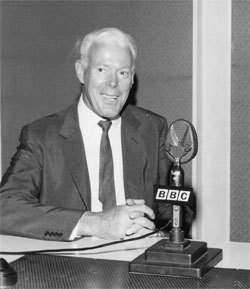Failing and Passing Examinations July 1984
Trevor Leggett was head of the Japanese Department of the BBC.

This is one of his broadcasts to Japan
Zubari for July 1984
A great scholar once told me: “One can fail in an examination in two ways. The first way is the ordinary one. The candidate does not know enough, so naturally the examiner marks his answers as WRONG.
But there is another way. This happens not so often. The candidate in this case knows much more about the subject than the examiner. He answers the questions – at least the difficult questions – brilliantly and absolutely correctly. But because the examiner himself does not know the subject so well, these answers are not what the examiner believes to be correct, so he marks them as WRONG.
In this second case, it is the examiner who is being tested, and he fails.”
When I heard this, I was reminded of a joke by the famous author and playwright Oscar Wilde. One of his plays did not find favour with the audience on the opening night, and they did not clap. Afterwards, one of his friends (who had not been there) asked him whether the play had been a success.
“Oh yes,” replied Wilde, “the play was a success. It was a brilliant success. But the audience was a failure.”
I have had several experiences like this, where an examiner is himself being tested, though he does not realize it.
After the Pacific War broke out, anyone who had been in Japan and claimed to know something of the language was, of course, of potential value to the country. But a great many British people, who had spent perhaps several years in Japan and seemed to believe that they knew Japanese well, had turned out to be almost useless. So, the Armed Forces inaugurated a system of testing, to weed out at the beginning those whose claims to know Japanese, either spoken or written, were baseless.
At the outbreak of the Pacific War, I was in the British Embassy in Tokyo, and we were all interned in the Embassy for about ten months. Then an exchange was arranged with Japanese Embassies in various British territories.
Tests
When I arrived back in London, I went to see Sir George Sansom, a great scholar of Japanese; he has written the standard History of Japan in English, in three volumes. He knew that I could speak and read Japanese to a considerable extent, and he told me to apply for a certain position with the Army.
“But I must tell you that you will first have to take the elementary examination in Japanese which everyone has to take. You will be examined by some young officer who has had a brief course in Japanese; he knows enough to recognize those who have no knowledge. He rejects them. When you have passed the examination which he will give you, you will see someone much higher up, to whom I have already mentioned your name.”
When I saw the young officer, he was very pleasant. He asked me a few questions in colloquial Japanese; my name, when I was last in Japan, and so on. His accent was very poor, and, obviously, he had never been in Japan. Then he asked me to read a passage in simple Hiragana, and seemed a bit surprised that I could do it. He passed over a sheet of Kana-kajiri, and asked me to translate it. I managed fairly well, except for two characters which I did not know.
He congratulated me, and then asked me to translate a few sentences from English into spoken Japanese. One of them ended: “… and therefore, I must go.” I translated this: “da kara, ikanakereba narimasen.” He said, “No, no. I must go – try again.” Again, I said: “Ikanakereba narimasen.” He looked disappointed, and said, “No, it is narimasu. The English is; I must go. So, the Japanese must be: ‘narimasu’, and not the negative ‘narimasen’.”
I perceived that this was a case where I knew more than the examiner so I gently said: “Ah, Narimasu, narimasu.” He looked satisfied, and I passed the examination.
This was a case where THE CANDIDATE knew so much more than the examiner that he was marked WRONG: Or at least, I should have been marked WRONG except that I amended my Japanese to suit his Japanese.
It was a useful lesson for life afterwards, and I remembered the story of a great Japanese jitsugyosha who always said, “Go mottomo” to people, even when he knew they were talking nonsense. When I first heard that story, I thought he was a fool; but after some experience of life. I realized that he had evolved a good technique for dealing with fools.
© Trevor Leggett